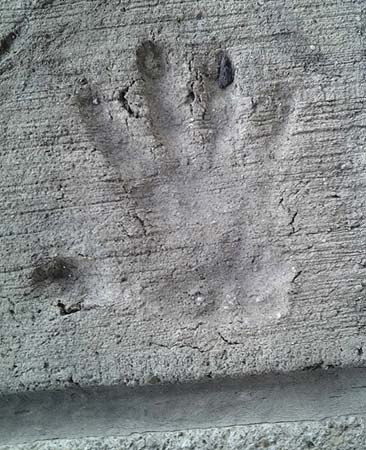When I walk, I frequently forget to look down. My eyes scan trees and the sky for signs that nature is still talking to me through its elaborate language. This tendency to look up can be a hazardous habit for a number of reasons: signs, cars, curbs, etc.
Fortunately, one day I looked down and saw this piece of concrete, and the impression of the hand caught my attention. While it wasn’t technically a part of nature, it still made me pause and think about the nature of middle level education. In fact, this section of concrete made me think about my first job teaching high school English, which was also my first lesson in impressionability.
One of the most common characteristics of my high school students was that they were already set—they were already sure of their futures and of their ability to affect those futures. Despite all of my pedagogical efforts, I found it hard at times to reach them. And despite my best instructional attempts, I had difficulty scratching through their resigned veneer.
Frankly, after four years, I had become jaded. Every day, I asked myself, “What kind of impact are you making on your students? And how are you being impacted by this whole process?” With these questions swirling and churning in my mind, I became a middle school teacher. And that’s where I discovered the real nature of concrete—in my seventh grade Basic Reading class.
Those kids were awesome. They were fun. They were curious. They were humorous. They wondered about the future, and they imagined their place in it. But they never settled or resigned themselves to it. They were explorers and they were great teachers, as well, because they taught me that I could still make an impression on someone’s life and that they could make an impression on mine, too.
We collaborated on this daily with tools that many of us had lost or neglected along the way: laughing, smiling, listening, caring, believing, helping, accepting, trusting. With our collective ethic of care, a commitment to relationships, and a responsive determination to support and growth, we pushed together.
To be clear, we weren’t pushing towards a test score or a numerical trophy, we were pushing to make a lasting impression on each other. We were driven to bring joy back to learning—for our minds and our hearts.
And perhaps that is the most important gift of middle level education: the ability to reverse the hardening of a heart. I will never forget that seventh grade class and the present they gave me.
Take some time to think about the impression you make on your students, and then thank the students—even if only in your heart—who have made an impression on you.
This We Believe Characteristics
- Educators value young adolescents and are prepared to teach them.
- Students and teachers are engaged in active, purposeful learning.
- The school is inviting, safe, inclusive and supportive of all.
- Every student’s academic and personal development is guided by an adult advocate.
How do we stir them?
And keep them from hardening –
All these beating hearts.
